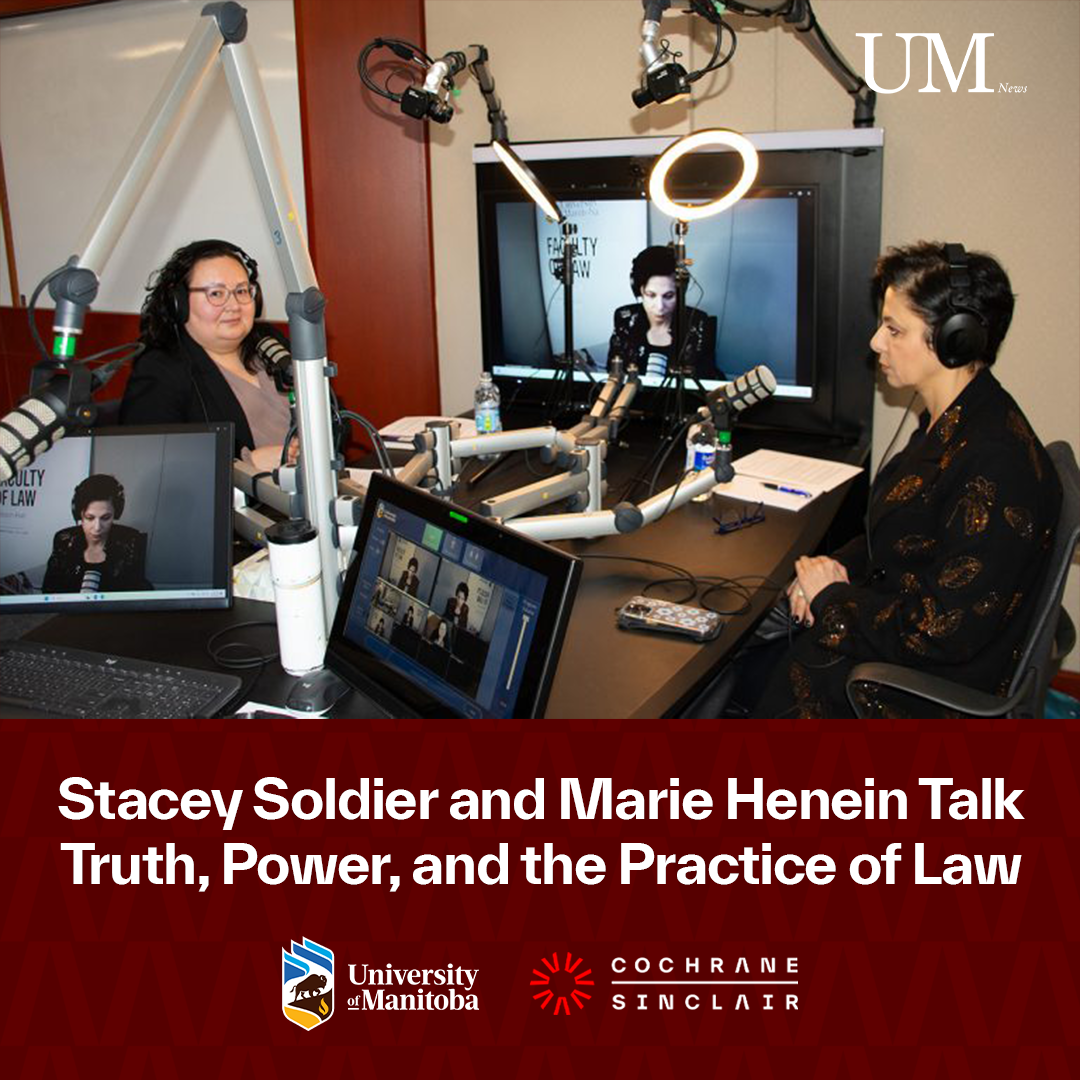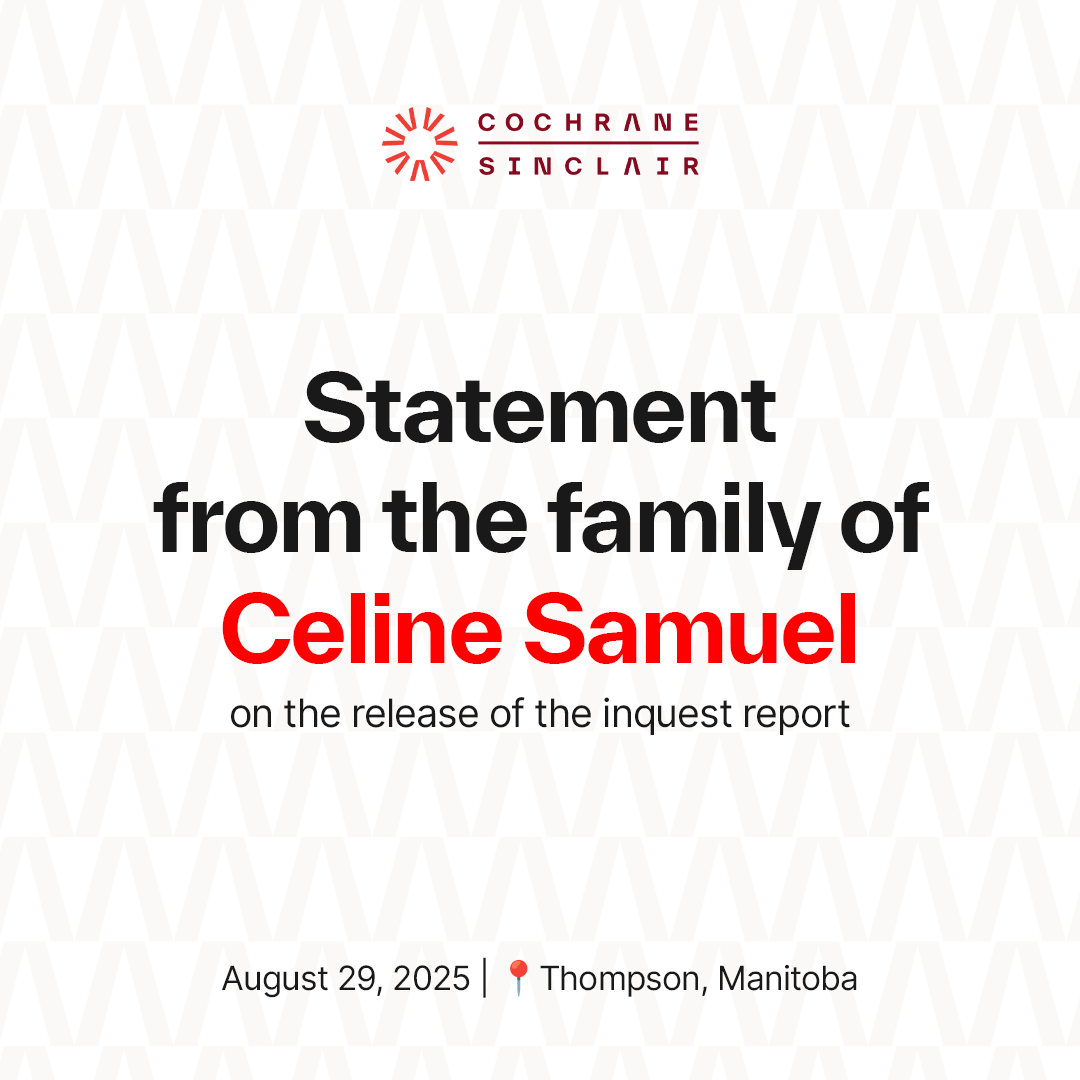Defending the Role of the Defence Lawyer in Canada’s Justice System
Earlier this year, Cochrane Sinclair LLP’s Senior Associate Stacey Soldier sat down for a powerful and timely conversation with acclaimed Canadian litigator Marie Henein as part of Robson Radio, the official podcast of the University of Manitoba’s Faculty of Law. Their dialogue touched on everything from the public’s misunderstanding of the criminal justice system to systemic racism, wrongful convictions, the pressures on women in law, and the urgent need for mentorship and diversity in the profession.
Marie Henein, known widely for her fearless courtroom advocacy and landmark legal work, was visiting Winnipeg to deliver the 2025 Harry Walsh Lecture. The lecture is named for the renowned Canadian lawyer and abolitionist whose legacy includes the end of capital punishment in Canada. Stacey, herself a trailblazer in Manitoba’s legal community and a proud member of Swan Lake First Nation, guided the conversation with deep candour and insight, drawing from her own experience as a criminal defence lawyer, instructor, and advocate for Indigenous justice.
“There’s no half measures when you’re dealing with people’s lives,” Stacey noted, referencing Henein’s book Nothing But the Truth. “It’s balls to the wall, all in, no stone unturned.”
The misunderstood role of the criminal defence lawyer
One of the core themes of their conversation was the frequent criticism faced by criminal defence lawyers for “defending the guilty.” Henein challenged this perception, explaining that the public often confuses the lawyer with the alleged actions of their client. But for her, and many others in the profession, the real concern is when this misunderstanding comes from within the legal community itself.
“The power of the state is so significant that without checks and balances, we’re on a dangerous path,” said Henein. “Defence lawyers don’t endorse crime. We protect the integrity of a system meant to ensure justice for everyone, including the most marginalized.”
Stacey echoed this by highlighting how many of her own clients, especially Indigenous clients, are subjected to over-policing and under-protection. A striking example she cited was how charges for riding a bicycle on a sidewalk are often used as pretexts for stop-and-search procedures in Winnipeg’s inner city. This type of charge rarely, if ever, appears in police reports in suburban neighbourhoods.
Political interference and the danger of “tough on crime” narratives
The conversation also addressed recent political decisions where elected officials distanced themselves from defence lawyers or removed colleagues for their connection to criminal cases. Henein expressed serious concern about these actions.
“When elected officials vilify defence lawyers for doing their jobs, it shows a fundamental misunderstanding of the Charter and of democracy itself,” she said. “It is performative, disrespectful, and puts the justice system at risk.”
Both Stacey and Marie called attention to how “tough on crime” language not only ignores evidence-based solutions like investments in housing, healthcare, and rehabilitation, but also fuels the mass incarceration of Indigenous peoples in Canada.
The emotional toll of advocacy and the need for systemic change
As two women who have forged paths in a profession that has not always been welcoming, both lawyers reflected on burnout, discrimination, and the invisible weight carried by racialized and female lawyers. Henein spoke about the fatigue that comes from constantly having to prove one’s worth. Stacey shared her own courtroom experience of being overlooked by a sitting judge in favor of junior male counterparts.
“If you’re not promoted, not referred, not included, then eventually you look for security somewhere else,” Henein said. “This isn’t about work-life balance. It’s about being seen, supported, and given a chance to succeed.”
Mentorship, visibility, and the next generation of lawyers
The conversation ended on a hopeful note as Stacey and Marie shared stories about mentorship and the importance of being visible to the next generation. Whether it was Henein’s early days working alongside Eddie Greenspan or Stacey’s recent experience welcoming an Indigenous high school student to a law school event, both emphasized how essential it is for young people to see themselves reflected in the profession.
“Seeing someone who looks like you, who has walked a similar path, makes the impossible seem possible,” said Stacey. “That’s why mentorship, visibility, and active support are essential if we want to build a more inclusive and equitable legal profession.”
About Stacey Soldier
Stacey Soldier is a Senior Associate at Cochrane Sinclair LLP. She practices primarily in criminal defence and child protection law. A graduate of the University of Manitoba Faculty of Law and a proud Anishinaabe woman from Swan Lake First Nation, Stacey is also a legal instructor at Robson Hall, an advocate for Indigenous rights, and the incoming President of the Manitoba Bar Association.


